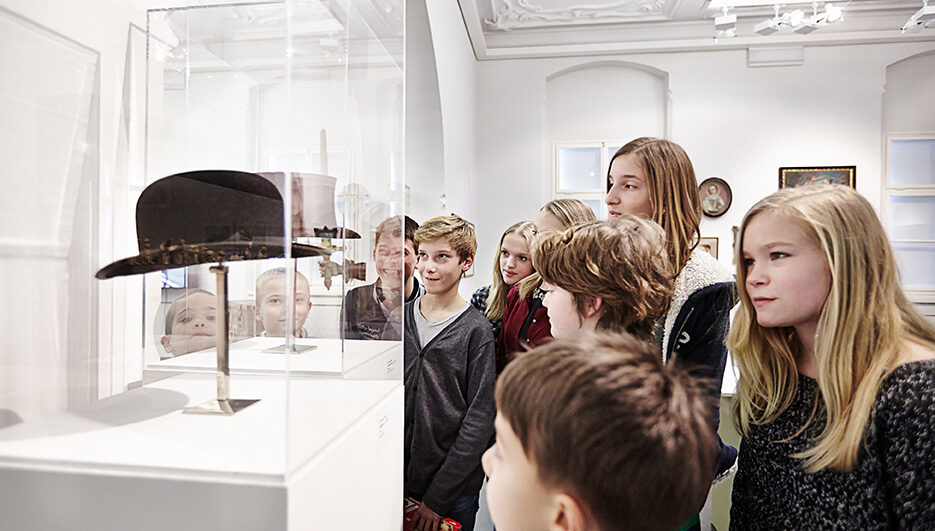Guided Tours, Workshops & City Talks for Students
The art and culture education program at Linz’s Stadtmuseum Nordico invites visitors of all ages and backgrounds to enter into a conversation about the city and its history. In this way, the museum becomes an open forum for discussion about what the city means to us nowadays and who tells its many different stories. The visitors’ own stories are just as important as those told by the objects.
We offer school classes a variety of opportunities to explore the city, immerse themselves in stories and invent a utopian-fantastic Linz. We open up a wide variety of workshops at the Nordico in order to get students thinking by doing things together.
| Category | Description | Price |
|---|---|---|
| Guided tour for school groups 1 hour | €4.00 | |
| Highlighttour 30 minutes | €3.00 |
Elementary schools, kindergartens, after-school care centers
Everybody builds!
Drawings, models and stories about very different buildings in Linz take us into the world of architecture. Based on the exhibition Built for Everyone, we build a city of the imagination out of various materials.
This is my Linz
The students get to know Linz from prehistory to the present. They work out the city’s history through models, pictures and individual object stories: What could this be? What could they have meant? Based on this, we ask how the people of Linz might have lived in the past and draw our own fantasy cities of the future.
Collecting, owning, showing and getting rid of things
How does a museum actually get its things, and what is a museum collection? Can everything be exhibited? Is everything allowed to be collected? Who decides what is exhibited? What stories do the things in the museum tell and who collected these things? And our own collections – where are they kept, who is allowed to see them, when do we give things away, and why do we collect at all? The students bring small things from their own collections to the Nordico Stadtmuseum, display them for a short moment in the museum and invent their own museum for their collection.
Grammar Schools
Everybody builds!
Drawings, models and stories about very different buildings in Linz take us into the world of architecture. Based on the exhibition Built for Everyone, we build a city of the imagination out of various materials.
Mini Po-Up Museum of Everyday Things
Students* build a mini pop-up museum with the things they currently have with them. In doing so, we consider: What do things actually need to become museum things? For example, a story to tell about the things and the museum might need a name. But we also discuss whether everything can and should be exhibited? Would we leave our everyday things to a museum? What happens if a museum wants to exhibit something that belongs to someone? So while we invent our own museum, we learn about the function of a museum, the difference between it and a Wunderkammer, the ethics of collecting, and the meaning of presentation.
Linz History(s)
In this conversational tour we experience, tell and invent stories about Linz based on individual objects from the collection presentation. The object stories in their interconnection result in multifaceted Linz stories and thus the tour enables an intensive and pleasurable learning of city history.
High School
Un/Order of Things
Rummaging through the “Wunderkammer” of Hofrat Anton Maximilian Pachinger, we ask ourselves what it means to collect and sort: Who brings order into the world of things? What orders do things bring into the world? What is exhibited, what remains hidden? Who determines which stories are told in a museum and how they are told? Who determines what is kept in a collection as the “history of the city”? These questions make it possible to learn about the history of the Nordico collection and, on this basis, to understand how a museum functions.
Conversation guide on the history of the city of Linz
In this discussion, the students work in small groups on individual aspects of the city’s history beyond the chronological narratives, such as everyday culture, family networks, and National Socialism. We use a combination of objects, quotations, and texts to convey the variety of ways in which history can be presented.
Contact & Booking
Karin Schneider (Head of Art Education) will be happy to advise you on selecting or putting together a suitable program for your group. Send an email to: karin.schneider@lentos.at, she will call you back.
